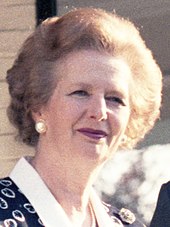Bruges speech

The Bruges speech was given by British prime minister
Thatcher had been invited to speak to the College of Europe in Bruges and decided to make her text a response to Delors' speech of 8 September. Thatcher's speech recounted Britain's history within and close connection to Europe and called for the EEC to resist a move towards
Despite its commitment that Britain would work within the EEC to reform it, the speech was perceived as
Background

The
On 6 July 1988, Delors spoke to the European Parliament and predicted that "10 years hence, 80 per cent of our economic legislation, and perhaps even our fiscal and social legislation, will be of Community origin". Thatcher perceived this as a provocation, a deliberate
Much of Thatcher's speech was drafted by her foreign-policy adviser
Speech
| External videos | |
|---|---|
| Speech to the College of Europe[5] | |
 Belfry of Bruges (pictured in 2008) | |
The speech was to be in a hall at the historic Belfry of Bruges on 20 September 1988.[2][5] Thatcher had planned to use an autocue but because of the venue's layout, with most of the audience sat to her sides, she chose to speak from her paper notes. She deviated slightly from the text but not in any politically meaningful manner.[5] A copy was sent in advance to Delors and, having read it, he refused to attend the event.[4] The Belgian prime minister, Wilfried Martens, was in the audience.[5]
Thatcher began her speech by noting that her last appearance before the College had been shortly after the
Thatcher stated that she believed that the
Thatcher then stated that "the European Community belongs to all its members. It must reflect the traditions and aspirations of all its members" and that Britain did not desire "some cosy,
Thatcher hailed the success of the February 1988
Thatcher concluded by arguing that Europe did not require any more treaties beyond the
The text of the speech was released to the media at 17:30 GMT by the Downing Street press office.[5] After finishing her speech, Thatcher left the event with her husband, Denis, and travelled to Brussels for an audience with King Baudouin. Afterwards, she had dinner with Prime Minister Martens and his cabinet members, during which a row erupted after Belgian foreign minister Leo Tindemans made a federalist comment.[4]
Impact

The speech was perceived as an attack on the "European project". However, Thatcher supported the
Though, in essence, a
After the Bruges speech, there was an increasing trend towards
The Eurosceptic Bruges Group think tank was founded in 1990 and named after the speech.[7] The original drafts of the Bruges speech were released by the Margaret Thatcher Archive Trust in 2018 under the thirty-year rule. The drafts showed that the final speech had been considerably toned down. Direct references to Delors were removed, and those to the European Commission were replaced with "European community". The use of the term "Euro waffle" was also removed.[4]
See also
References
- ^ European Community at the Encyclopædia Britannica. Retrieved 13 December 2020.
- ^ a b c d e f g h i j k l m Moore, Charles (28 September 2019). "Margaret Thatcher biography: How the Bruges speech was deemed a declaration of war that caused 'absolute horror' in Brussels". The Telegraph. Retrieved 13 December 2020.
- ^ a b c d e f Willetts, David (31 August 2018). "How Thatcher's Bruges speech put Britain on the road to Brexit". Financial Times. Retrieved 13 December 2020.
- ^ a b c d e f g Dixon, Hayley (21 July 2018). "Margaret Thatcher's famous Bruges speech was to have been much more critical before it was toned down". The Telegraph. Retrieved 13 December 2020.
- ^ a b c d e f g h i j k l m n o p "Speech to the College of Europe ('The Bruges Speech')". Margaret Thatcher Foundation. 20 September 1988. Retrieved 13 December 2020.
- ^ ISBN 978-0-7425-1054-8.
- ^ a b c Green, David Allen (25 September 2018). "Why Thatcher's Bruges speech was not a first step towards Brexit". Financial Times. Retrieved 13 December 2020.
- ^ S2CID 142792443.
- OCLC 489636152.

